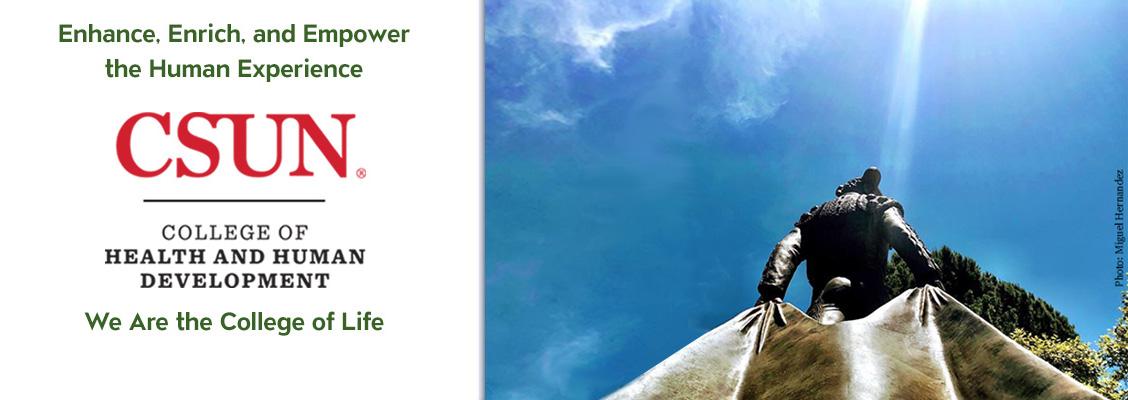 Ben B. Yaspelkis III, Ph.D., FACSM, (Professor, Kinesiology) has been named the 2013-14 CSUN Research Fellow from the College of Health and Human Development. Each academic year, nine fellowships are awarded to faculty across campus to support research and academic development in their fields of study.
Ben B. Yaspelkis III, Ph.D., FACSM, (Professor, Kinesiology) has been named the 2013-14 CSUN Research Fellow from the College of Health and Human Development. Each academic year, nine fellowships are awarded to faculty across campus to support research and academic development in their fields of study.
Yaspelkis is also the Director of the Exercise Physiology and Biochemistry Laboratories for the department. The fellowship year will support him in the pursuit of his research project on diabetes, “Skeletal Muscle Insulin Resistance: The IKK pathway’s impact on insulin signaling.”
“Diabetes is the seventh leading cause of death in the United States,” Yaspelkis said, “And among the adult population of the US, about 26 million, some as young as 20 years old, already have Type 2 Diabetes. There were almost two million new cases diagnosed in 2010.” The disease also exacts a financial cost nationally, topping $175 billion a year.
“We want to get a detailed understanding of just how--and how much--diet and exercise can actually influence the course of the disease,” he said. “While skeletal muscle insulin resistance and Type 2 Diabetes can result from genetic origins, there are also environmental factors, such as diet and exercise, weight and body fat content, that affect the insulin response.” Yaspelkis’ research will seek to resolve exactly how impairments in skeletal muscle insulin signaling are manifested and if the defects are reversible, either partially or entirely. Specifically, the research will focus on inflammatory responses to nutrition and exercise and will add to his body of research on diabetes while seeking approaches to treatments that may improve the condition.
Mentorship and engaging students in the lab has always been an important aspect of Yaspelkis’ work; many students have co-authored publications with him and, because of these collaborations, have presented at professional conferences and student research competitions. His students have placed third or higher more than 10 times.
He also directs students toward professional publication of the research. “Since I came to CSUN in 1996, 32 of the 38 peer-reviewed articles I’ve published were co-authored by students,” he said. “They’re coordinating experiments, working with data collection and analysis, and, of course, preparing data for presentation or publication.” Students will work alongside Yaspelkis during the fellowship year, participating in a variety of experimental interventions designed to advance the body of research that seeks to understand the ways that skeletal muscle insulin resistance may develop. “With the exception of performing the surgical isolations that examine the biochemistry of the animals, students are directly involved in every aspect of the study,” he said.
“In the lab, we’ve worked extensively with an environmental model of insulin resistance and have been examining diet and exercise. We feed rats a high-fat diet and study its impact on skeletal muscle insulin resistance,” Yaspelkis said. “Several years ago we discovered the high-fat fed rodent would experience a reduction in the physiological mechanisms that are usually stimulated by insulin. We wanted to find out why.”
So far, Yaspelkis and student teams have identified two independent mechanisms that are changed by the diet, and which may impair insulin-stimulated activation of a key enzyme. “I’m generalizing here,” he said, “but the high-fat diet was also shown to contribute to decreased efficiency in metabolizing sugars.”
Homing in on what extent of insulin-stimulated enzyme activity can be restored in skeletal muscle that has become insulin-resistant will also be informed by information about the effect of aerobic and resistance exercise on the metabolic processes that lead toward--or away from--diabetes in certain types of rodents and ultimately, in humans. “The question of how exercise exerts a positive effect on insulin action is of critical importance because efforts in this area will aid in the discovery of the cellular and molecular pathways that underlie improvements,” Yaspelkis said. “The information we ascertain will show what factors contribute to the identification of key targets that could provide the foundation for the design of alternative treatment therapies for Type 2 Diabetes.”
The fellowship was created in 2007 and is funded collaboratively by the Office of the Provost, the Colleges and the Library.
Ben Yaspelkis received both his PhD and MA from the University of Texas. Both degrees are in Kinesiology with a specialization in Exercise Science. He also has a Bachelor of Science in Sports Medicine from Pepperdine University.






